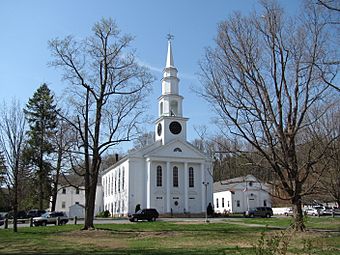Thomas Hollis Historic District facts for kids
Quick facts for kids |
|
|
Thomas Hollis Historic District
|
|

First Congregational Church
|
|
| Location | Holliston, Massachusetts |
|---|---|
| Area | 143 acres (58 ha) |
| Architect | Payson, Edwin |
| Architectural style | Mid 19th Century Revival, Late 19th And 20th Century Revivals, Late Victorian |
| NRHP reference No. | 89001786 |
| Added to NRHP | October 30, 1989 |
The Thomas Hollis Historic District is like the old town center of Holliston, Massachusetts. It runs along Washington Street (Routes 16 and 126) for about a mile, from Winter Street to Highland Street. This area was started as a town in 1724. Today, it has many well-kept buildings, mostly from the 1800s. This special district was added to the National Register of Historic Places in 1989 because of its important history.
Exploring Holliston's Historic Heart
Holliston was first settled by European families in the 1680s. Back then, it was part of Sherborn. The town officially became Holliston in 1724. It was named after Thomas Hollis, a rich merchant from England.
Early Beginnings
When Holliston became a town, its first meetinghouse was built. This was a place for town meetings and church services. The first cemetery, Central Cemetery, was also started around this time. You can find it near the town offices today. Washington Street, the main road, was built in 1731. It connected Holliston to Mendon. Some of the oldest houses, like the Isaac Foster House at 627 Washington Street, were built in the 1720s.
Growth in the 1800s
Holliston grew a lot before the American Civil War (which ended in 1865). Many beautiful houses were built in the town center during this time. These homes often showed off popular styles like Federal and Greek Revival architecture. Important town buildings were also constructed. The First Congregation Church, built in 1822, is a good example of the Federal style. The Town Hall, built in 1855, has an Italianate style.
Other churches were built too, but only the Methodist Church from 1833 still stands. It has been changed a lot and is now a Masonic hall. After the Civil War, the town grew slowly until the railroad arrived around 1900. Then, several brick stores and businesses were built. The Holliston Public Library, built around 1903, also opened thanks to money from Andrew Carnegie. Even though some newer buildings have appeared, much of the town center still looks like it did around the early 1900s or even earlier.
 | Janet Taylor Pickett |
 | Synthia Saint James |
 | Howardena Pindell |
 | Faith Ringgold |



